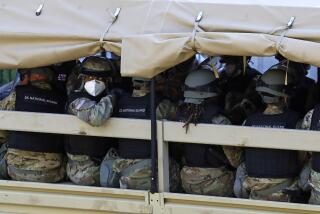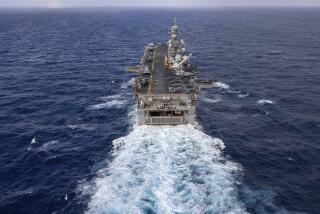U.S. Weighs Heightened Role for Special Operations
- Share via
WASHINGTON — Senior Pentagon officials are planning to hand the U.S. Special Operations Command a lead role in some missions in the war on terrorism, giving the elite command a measure of independence from the U.S. Central Command, which has been directing the effort, defense officials said Tuesday.
Army Gen. Tommy Franks, the head of Central Command, has been the top military commander in the war in Afghanistan, where special operations soldiers have played a leading role that military analysts call unprecedented. But after discussions between Defense Secretary Donald H. Rumsfeld and senior military and civilian leaders on ways to intensify the search for Osama bin Laden and lingering members of his Al Qaeda terrorist organization, Rumsfeld is expected to give some autonomy to the Special Operations Command, or SOCOM.
‘“There will be instances in which SOCOM has the lead,” Pentagon spokeswoman Victoria Clarke said late Tuesday. “There will be many instances where SOCOM doesn’t have the lead. But it would be wrong to say that SOCOM will be the supported command going forward.”
The unusual proposed arrangement is separate from larger organizational shifts in the Pentagon and is apparently rooted in an effort by Rumsfeld and senior military leaders to bring in more high-profile Al Qaeda leaders, such as Ramzi Binalshibh, the man believed to have been the lead coordinator of the Sept. 11 terrorist attacks, who was captured in a raid in Pakistan last week and is now in U.S. custody.
“People have got to redouble their efforts,” Clarke said.
She emphasized that Rumsfeld has not made a final decision on the proposed change, and would not elaborate on when SOCOM would take the lead over the regional command. The move, first reported in today’s editions of the Washington Post, would transfer decision-making in some instances from one end of MacDill Air Force Base in Tampa, Fla., where both commands are located, to another.
Special operations include an elite group that consists of Army Special Forces, or Green Berets; the Delta Force, a group so secret the Army officially does not acknowledge it exists; Navy SEALs; and Air Force combat controllers and search-and-rescue airmen. The low-profile fighters have gained newfound clout through their success in leading Afghan forces to a rapid victory over the Taliban. They worked closely with local fighters in Afghanistan but reported to Central Command. Under the proposed arrangement, the top decision-maker would be the SOCOM commander, Air Force Gen. Charles Holland.
The elite soldiers have played a lead role in maintaining relationships with Afghan warlords and scouring the porous tribal region of Pakistan along the Afghan border. They have also been providing personal security for Afghan Prime Minister Hamid Karzai. The 12-man groups of special operators linked with Northern Alliance generals in the north marched into Kabul with Mohammed Qassim Fahim and led Karzai to sweep the region surrounding the Taliban’s last stronghold of Kandahar.
The new arrangement could allow them to direct those or other efforts more quickly and without going through another layer of approval from Central Command.
The basic role of special operations is unlikely to change, Gen. Paul V. Hester, who works under SOCOM as commander of the Air Force Special Operations Command, said in an interview earlier this month. Although the proposed arrangement would grant special operation commanders more control, they have traditionally sought to remove their soldiers as soon as possible once their mission ends.
In Afghanistan, some special operation soldiers have expressed a desire to move on to other duties, although instability in the nation and their close working relationships with local warlords have kept many there long after the last major battle ended in March.
“We need to concentrate to capitalize on that trained work in the battlefield,” Hester said in the Sept. 9 interview. “And when that special training is not needed--when you can hand off to the conventional forces--you needed to do that as quickly and as seamlessly as possible.”
Much of the fighting in Afghanistan is now in the hands of conventional military units, such as the Marines and the Army’s 101st Airborne and 10th Mountain divisions.
“Special operations was there, handed off to the [conventional] corps and moved ahead to do special ops things,” Hester said, noting that Franks has kept special operation soldiers on special missions. “I think he still sees in some of those unique places in the caverns and in the caves and in the mountains--places for special operators to go and use their talents.”
Central Command’s mission has been stretched in contingency planning for a possible war with Iraq. The command announced last week that it would send 600 soldiers from Tampa to Al Udeid Air Base in the Persian Gulf nation of Qatar, where an air war might later be directed against Iraq. Central Command officials described the move as an exercise to test the readiness of newly designed mobile communication facilities.
More to Read
Sign up for Essential California
The most important California stories and recommendations in your inbox every morning.
You may occasionally receive promotional content from the Los Angeles Times.













